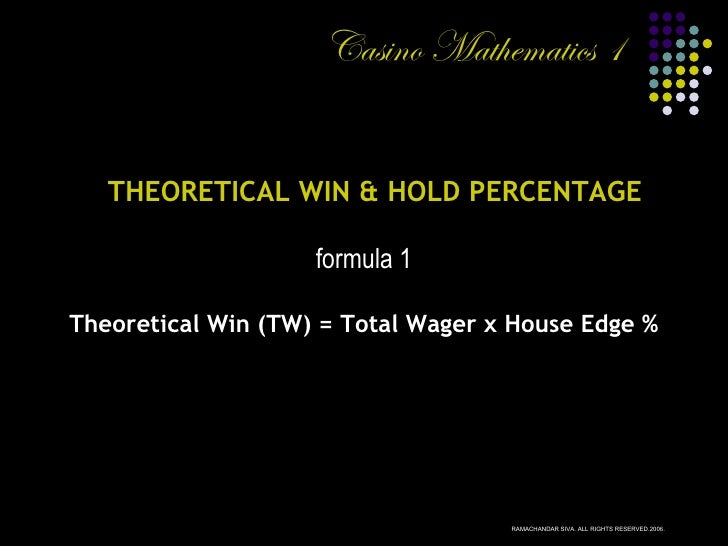Casino Theoretical Win Equation
Theoretical win and the standard deviations of expected value have been widely covered in numerous articles. Unfortunately for me, the discussion on the topic has seldom been comprehensive enough to be understood by the layperson (meaning me). This post attempts to explain the issue in the simplest possible way. Why is this important? Theoretical win is derived from the probabilities built into any casino game. As all casino games are designed (in theory) to guarantee a return to the casino, the theoretical win (winnings for the player) is always negative while the expected value, also known as expectation (winnings for the casino) is always positive. However, like with all probabilities, an element of randomness exists. The standard deviation of theoretical win thus provides a threshold for casino managers to decide if play has passed the limit where it becomes suspect. Theoretical Win and Expected Value The average of results is determined by the theoretical win formula. Hence, 50% of all

Casino Theoretical Win Equation Generator

Casino Theoretical Win Equation Calculator
- My name is Joshua, and I’m a 30-something who works in tech as a marketer by day, and dabbles in casinos periodically during off-times. Know Your Slots will reflect my interests in understanding the various ways you can play slots, games that give you a potential edge, casino promotions and systems and how you can get the most out of it.
- Comps are usually figured as a percentage of the casino's theoretical win from a player. Take the amount of action you give, multiply by the house edge, and then take some percentage of that result to calculate the comp amount. The more you play on low payback slots, the greater your comps.
Casino Theoretical Win Equations
Roulette: $25 bet. 60 spins per hour. 5.26% HA= $78.90 theoretical loss Depending on the exact rules of your games and the pace of play in your casino, you can adjust the decisions/hour and house advantage to get a more accurate theoretical loss. Assume we offer lottery 2 and sell 500,000 tickets. Thus, the total amount wagered is $500,000. We know that exactly 90% of the tickets are winning tickets. So, based on knowing the house edge, we expect the players to win approximately 90% of $500,000, or about $450,000. The state has a theoretical win of $50,000 to purchase shoes for the kids. Over every six trials, the probability is that you’ll win five bets and lose one bet. You win $5 and lose $4 for a net win of $1 for every 6 bets. $1 divided by six bets is 16.67 cents. Your house edge is 16.67% for this game.